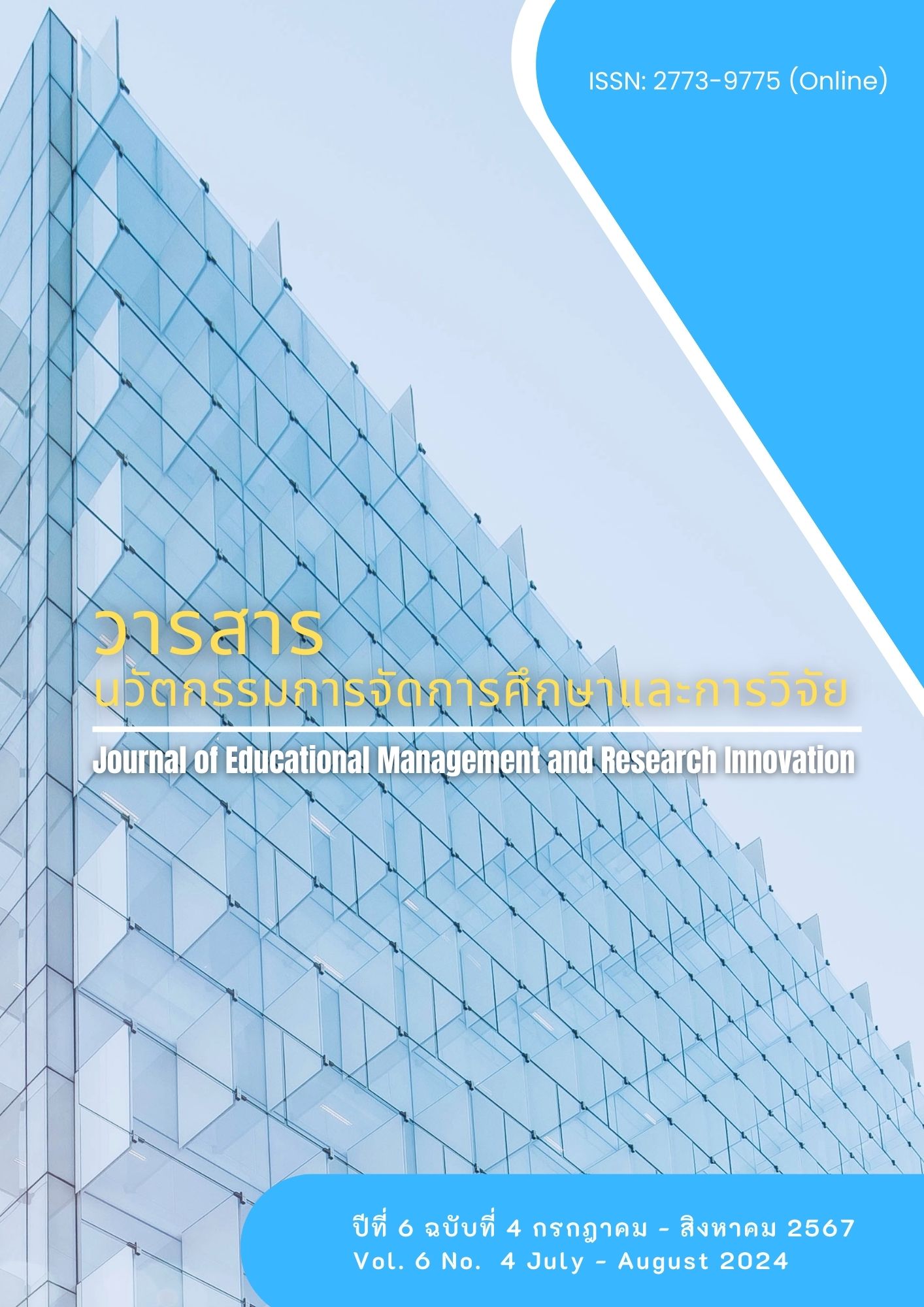The EFL Undergraduate Student's Attitudes toward The Use of GFOS Model to Promote Reading Comprehension Based on Collaborative Learning Approach
Main Article Content
บทคัดย่อ
Reading plays a pivotal role in acquiring knowledge, yet it presents difficulties for EFL students, notably in Thailand, where English is taught as a foreign language across all educational tiers. This research delves into EFL students’ attitudes toward using the GFOS model to promote reading comprehension. A qualitative research methodology was deemed suitable for this inquiry. 24 Participants were second-year English major at the Faculty of Education, Kamphaeng Phet Rajabhat University, and six individuals were chosen for semi-structured interviews based on their English language proficiency. The result of the study highlights that the GFOS model significantly enhances reading comprehension by promoting collaborative learning and peer interactions. It engages students dynamically, facilitating an exchange of knowledge that creates an optimal learning environment. Furthermore, including culturally and locally relevant content in reading materials allows students to better connect with the texts, improving their understanding. Students respond positively to the GFOS model, recognizing its impact on their learning process. This research is a valuable resource for educators, demonstrating how integrating collaborative activities and relevant materials can boost educational outcomes in reading comprehension.
Article Details

อนุญาตภายใต้เงื่อนไข Creative Commons Attribution-NonCommercial-NoDerivatives 4.0 International License.
เอกสารอ้างอิง
Aminullah, F., Sada, C., & Sudarsono, S. (2019). Local Cultural-Based Reading Materials for EFL Context. Proceedings International Conference on Teaching and Education (ICoTE), 2, 193-197.
Avivah, A., Fitri, H., & Khaeroni, K. (2022). The Utilization of Text Summary Techniques to Improve Students’ Reading Comprehension Skills. Journal of Integrated Elementary Education, 2(2), 95-104.
Balqis , M. N. (2022). Students’ Difficulties in Reading Comprehension. English Language Study and Teaching Journal (ELASTE), 3(1), 18-24.
Besonia, B. A., Espora, S. H., Bernardez, M. M., & Galagala, M. G. (2023). Culturally Relevant Supplemental e-Learning Materials in Teaching Purposive Communication. TEM Journal, 12(2), 634-639.
Boonsuk, Y., Wasoh, F. E., & Ambele, E. A. (2023). Repositioning English and Teaching Practices in Global Englishes: A Critical Perspective from Thai Higher Education. Language Teaching Research, 12(3).
Boyle, G. (2022, January 21). Bangkok Post Learning. Retrieved from Bangkok Post: https://www.bangkokpost.com/learning/
Chunsuwan, I., Sarisuta, P., Hansakunachai, T., & Sritipsukho, P. (2022). Behavioral Problems in Grade One Students with Reading Difficulties in Thailand: A Cross-Sectional Study. Siriraj Medical Journal, 74(8), 509-517.
Daniels, H. (2002). Literature Circles: Voice and Choice in Book Clubs & Reading Groups. Portland: Stenhouse Publishers.
Hamid, M. A., & Yulianto, Y. (2022). Reading Difficulties of EFL Students: A Case Study of First-Year Student of English Language Education FKIP UIR. IJET : Indonesian Journal of English Teaching, 11(1), 46-56.
Harianingsih, I., & Jusoh, Z. (2022). Perceptions of EFL Students in Different Proficiency Levels Toward Group Work Experiences During Online Learning. International Journal of English and Applied Linguistics (IJEAL), 2(3), 424-430.
Heilman, A. W., Blair, T. R., & Rupley, W. H. (1990). Principles and Practices of Teaching Reading. Virginia: Merrill.
Lan, N. T. (2023). Reading Comprehension Difficulties among English Majored Sophomores at A University in Vietnam. International Journal of Scientific Research in Science and Technology, 10(2), 890-905.
Nengah D. H., Ida B. N. M., & Nyoman, I. S. (2019). Integrating Collaborative Learning in Cyclic Learning Sessions to Promote Students’ Reading Comprehension and Critical Thinking. International Research Journal of Management, IT & Social Sciences, 6(5), 303-308.
Perrodin, D. D. (2021). Thai Undergraduate Student Awareness of Regular and Irregular Grapheme-Phoneme Correspondence. Journal of English Teaching and Learning Issues, 4(1), 1-18.
Praimahaniyom, T. (2020). The Development of GROUPS Model to Enhance English Speaking Skill for EFL Learners (Unpublished Doctoral Dissertation). University of Phayao.
Putra, I. G., Krismayani, N. W., & Arsana, A. A. (2023). Implementing Collaborative Strategic Reading (CSR) in Teaching Reading: an Action Research. Jurnal Santiaji Pendidikan, 13(1), 34-39.
Reformista, M. N., & Khofshoh, Z. A. (2022). Collaborative Strategic Reading (CSR) in The Effectiveness of Teaching Reading Comprehension. Karangan: Jurnal Bidang Kependidikan, Pembelajaran, Dan Pengembangan, 4(1), 49-57.
Samaraweera, S. (2023). Second Language Reading and Vocabulary Acquisition by Adult Learners of English. Vidyodaya Journal of Social Sciences, 8(1), 158-173.
Slavin, R. (1995). Cooperative Learning: Theory, Research, and Practice. Boston: Allyn & Bacon.
Tanjung, N. J., Lubis, Y., & Daulay, E. (2022). The Effect of Pre-Reading, While Reading, and Post Reading Activities to Monitor Students’ Comprehension in Reading Narrative Text. INSPIRATION: Instructional Practices in Language Education, 1(2), 16-30.
Teferra, B. Y. (2022). Improving Students’ Reading Comprehension Skills through Short Stories in Higher Education Institutions. Asian Journal of Education and e-Learning, 10(3), 30-41.
Vygotsky, L. (1978). Mind in Society. The Development of Higher Psychological Process. London: Harvard University Press.
Zavaraki, E. Z., Mehdi , V., Noroozi, A., & Bakhtiarvand, M. (2023). The Impact of Blended Collaborative Learning on the English Reading Comprehension. Randwick International of Education and Linguistics Science Journal, 4(1), 1-12.
Zuo, W. (2011). The Effects of Cooperative Learning on Improving College Students’ Reading Comprehension. Theory and Practice in Language Studies, 1(8), 986-989.


